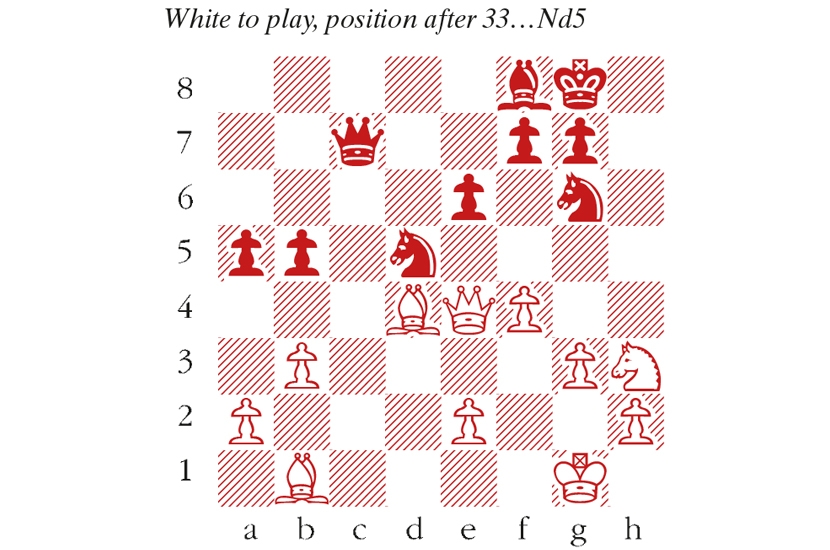Send in haste, repent at leisure. It is a cruel certainty that you will sooner or later text your intimate thoughts to the wrong person, or hit ‘reply all’ by accident. The second you spot this, your heart will leap into your mouth. That sensation is much like how a mouse slip feels during an online game of chess, when you move a piece and release it on the wrong square. If the universe is merciful, it hardly matters and the game goes on. In the worst case, you’re done for: it’s time to resign.
Internet chess provides another way to shoot yourself in the foot. To make a ‘pre-move’, you draw an arrow on the board to indicate a move before it’s your turn. As long as your move is legal, it will be played regardless of what your opponent does. The advantage is that your response will be executed instantly, saving a precious second or two. Used judiciously, these time savings add up. If your opponent is in check, with only limited options, a pre-move can be perfectly safe.
But look before you leap. Perhaps, playing Black, you like to fianchetto your king’s bishop, and you meet 1 d2-d4 with 1…g7-g6. While you’re waiting, you pre-move 2…Bf8-g7. Anticipating your intention, your sneaky opponent gambles with 2 Bc1-h6. Normally this blunders White’s bishop, but it proves to be a masterstroke when your pre-move 2…Bf8-g7 hits the board. The move 3 Bh6xg7, costs you your bishop, your h8-rook, and your dignity.
Garry Kasparov retired in 2005, but still makes occasional appearances in exhibition events. Earlier in September, he played in the Champions Showdown organised by the St Louis Chess Club. Kasparov, now 57 years old, got off to a decent start. He had beaten 17-year-old Alireza Firouzja, one of the world’s brightest talents, drawn a difficult endgame against Magnus Carlsen, and lost against Peter Svidler. Things unravelled in the fourth round, against Fabiano Caruana.
This was ‘Chess 9LX’ (better known as Chess960, or Fischer Random chess), in which the pieces on the back rank are shuffled before the game begins. (There are 960 possible combinations). Kasparov was in control, with an extra pawn and a strong pair of bishops, when disaster struck on move 34 (see diagram). He intended to play 34 Qe4-c2, offering an exchange of queens and contesting the c-file. But he dropped the queen halfway, so 34 Qe4-d3 was played: a slip, though not a fatal one. In his haste to fix it, he dragged the misplaced queen from d3 to c2, which inadvertently registered as his next move. Since ‘Fabi’ played 34…Bf8-c5, Garry’s unintended move 35 Qd3-c2 was a disastrous blunder, losing the bishop with check and prompting instant resignation.
The start position for this game had Ba1, Bb1, Rc1, Qd1, Ne1, Kf1, Ng1 Rh1. Black’s setup mirrors that: Ba8, Bb8… etc.
Garry Kasparov–Fabiano Caruana
Champions Showdown: Chess 9LX, Sept 2020
1 c4 c5 2 b3 b6 3 Ngf3 Nef6 4 d4 e6 5 O-O Castling rules are adapted in Chess960: move Kf1 to g1 and Rh1 to f1. 5…Ne7 6 Qd2 Ng6 7 Nd3 Qe7 8 Rfd1 cxd4 9 Nxd4 O-O Move Kf8 to g8 and Rh8 to f8. 10 Qb4 Bd6 11 Qc3 Rfe8 12 Nb5 Bb8 13 Qb4? d6? 13…Bxh2+! initiates a winning attack. 14 f3 a6 15 Nd4 a5 16 Qe1 d5 17 cxd5 Nxd5 18 Rxc8 Rxc8 19 Rc1 Rd8 20 Nc6 Bxc6 21 Rxc6 Qg5 22 g3 h5 23 Qc1 Qe7 24 Rc8 h4 25 f4 Bd6 26 Qc6 Qf8 27 Rxd8 Qxd8 28 Qc4 Bf8 29 Bd4 h3 30 Nf2 b5 31 Qd3 Nb4 32 Qe4 Qc7 33 Nxh3 Nd5 (see diagram) 34 Qd3? Bc5 35 Qc2?? Bxd4+ White resigns






Comments